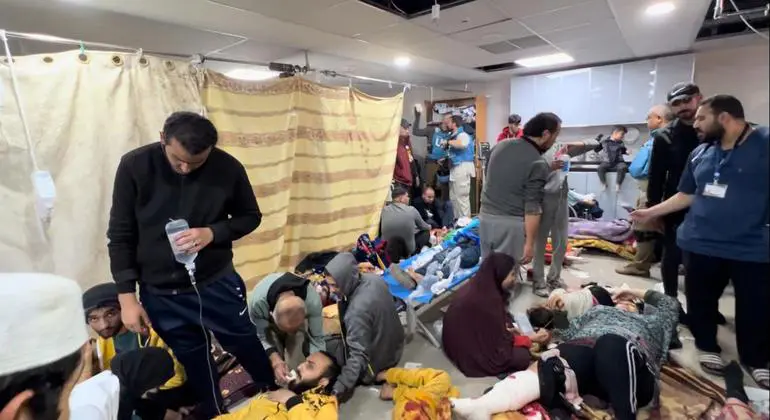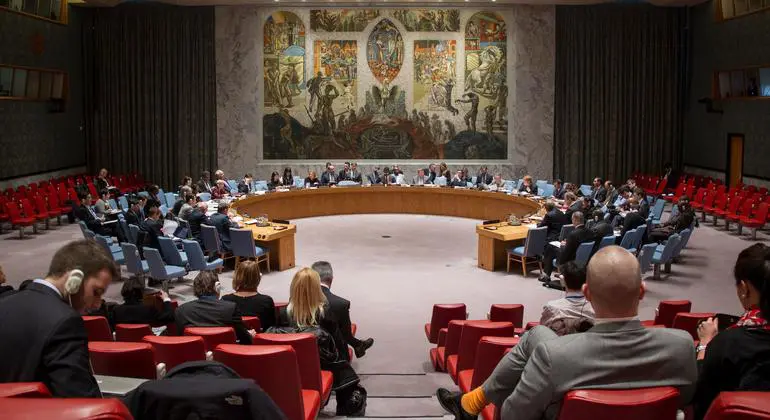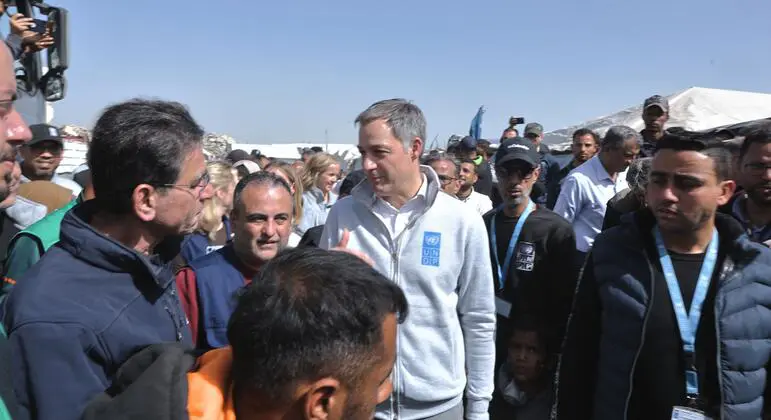In central Gaza, the UN World Health Organization (WHO) warned on Sunday that medics at the only functioning hospital in Deir al Balah governorate “had been forced to cease lifesaving and other critical activities…and leave” after an evacuation order issued amid “increasing” Israeli military activity.
Only five doctors reportedly remain at Al-Aqsa Hospital in the Middle Area of Gaza, where a WHO team delivered medical supplies to support 4,500 dialysis patients for three months and 500 patients requiring trauma care.
Patients treated on the floor
From Al-Aqsa, WHO Health Emergency Officer Sean Casey posted a video on X social media platform on Sunday evening showing chaotic scenes as medics treated patients on the blood-streaked floor, some of the “hundreds” being brought in for urgent treatment.
“They are seeing in some cases hundreds of casualties every day in a small emergency department,” Mr. Casey said. “So, they’re treating children on the floor.”
Echoing those concerns, WHO Director-General Tedros Adhanom Ghebreyesus in a post on X reported “immense needs” at the hospital, “especially health workers, medical supplies and beds. But staff said their greatest need was for their hospital, and its staff, patients and families there, to be protected from strikes and hostilities.”
More than 600 patients “and most health workers” had reportedly been forced to leave the facility, Tedros said, adding that it was “inconceivable” that the protection of health care could not be counted on.
According to the UN health agency, no hospitals are “fully functioning” in northern Gaza. Another WHO mission had to be cancelled to the north on Sunday, Tedros said, “due to dangers and lack of necessary permissions”. Elsewhere in Gaza, “a mere handful of health facilities operate”, the WHO chief said.
In recent days casualty numbers have “increased markedly”, Tedros continued, with “over 120 trauma cases and dozens of dead arriving per day due to increased shelling, gunshot wounds, crush injuries from collapsed buildings, and other war-related trauma”.
WHO is also involved in plans to deploy an emergency medical team to support medical teams at Al-Aqsa. “This will only be possible in a secure environment,” the UN health agency’s Director-General noted.
Children wait to be served food in Rafah, in the southern Gaza Strip.
Targets struck in north
In a separate update on the emergency confirming “intense” Israeli strikes “across (central) Deir Al Balah governorate and the southern cities of Khan Younis and Rafah”, OCHA reported on Sunday evening that Israeli forces “struck targets in Gaza city, Jabaliya Camp, Tal Az Za’atar, and Beit Lahiya” causing “a very large number of fatalities” in the Al Fallouja area of Jabaliya Camp.
Rocket fire into Israel by Palestinian armed groups also continued, the UN aid office said, amid “ground operations and fighting…across much of the Gaza Strip, resulting in additional fatalities”.
No end to rising toll
Latest data from the Gazan health ministry cited by the UN aid wing indicated at least 22,835 fatalities since Israeli military strikes began, in response to Hamas-led terror attacks in southern Israel on 7 October that left some 1,200 dead including at least 33 children and around 250 taken hostage.
OCHA also noted reports of 225 Palestinian fatalities between Friday and Sunday and almost 300 injured, with 174 Israeli soldiers killed in Gaza and more than 1,000 injured since ground operatio
ns began, according to the Israeli Defense Forces.
Deadly disease threat
Amid ongoing deadly violence, UN Children’s Fund UNICEF estimated that there are now approximately 3,200 new cases of diarrhoea per day among under-fives. Before the escalation in hostilities, the average was 2,000 per month.
There is also dire concern for nine in 10 children under two years old who are now in “severe food poverty” and “only getting grains (including bread) or milk” to eat.
“Time is running out. Many children already face severe acute malnutrition in Gaza,” said UNICEF’s Executive-Director Catherine Russell. “As the threat of famine intensifies, hundreds of thousands more young children could soon be severely malnourished, with some at risk of death. We cannot allow that to happen.”
Updated information from OCHA on the number of aid trucks entering Gaza indicated that on 6 and 7 January, a total of 218 trucks carried food, medicine and other supplies through the Rafah and Kerem Shalom crossings. Before the conflict erupted, more than 500 trucks carried aid into the Strip every day, some 60 per cent passing through Kerem Shalom.

Secretary-General António Guterres (right) meets with Sigrid Kaag, Senior Humanitarian and Reconstruction Coordinator for Gaza.
UN Coordinator for Gaza
The new Senior Humanitarian and Reconstruction Coordinator for Gaza officlally began her role on Monday. Sigrid Kaag will facilitate monitor and verify relief shipments coming in to the stricken enclave, in line with the Security Council resolution 2720 passed last month.
She has held a number of senior humanitarian jobs within the UN but most recently served as finance minister for the previous administration in the Netherlands.
Ms. Kaag will also have the challenging task of establishing a mechanism for accelerating aid into Gaza through States which are not party to the conflict.
She was in New York meeting the UN Secretary-General on her first day in office but will be heading to Washington DC later in the week before travelling to the Middle East.







